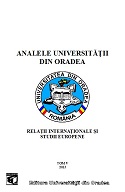DIFFERENTIATED INTEGRATION - FROMTHEORY TO PRACTICE. DETERMINERS IN THE INTEGRATION PROCESS OF THEWESTERN BALKANS: ETHNICITY
DIFFERENTIATED INTEGRATION - FROMTHEORY TO PRACTICE. DETERMINERS IN THE INTEGRATION PROCESS OF THEWESTERN BALKANS: ETHNICITY
Author(s): Mircea Brie, Daniela BlagaSubject(s): Politics / Political Sciences
Published by: Editura Universitatii din Oradea
Keywords: EU; Western Balkans; (differentiated) integration; ethnicity; cooperation; region; enlargement
Summary/Abstract: Most studies of differentiated integration are limited to the European Union, to the relations between the existing Member-States, and to the various institutional arrangements. The relationship between the European Union and the Western Balkans offers the support for testing the concept of differentiated integration on the dynamics recorded between the EU and a group of foreign states. Different Balkan states signed different contractual agreements with the European Union, with the expressed wish to consolidate their European perspective. The EU has a large range of initiatives, already implemented or in the process of implementation, for the Western Balkans. One such key initiative is the regional approach, which pushes the Western Balkan states toward forms of regional cooperation that need to be achieved if progress is sought in their contractual relations with the EU. This approach of the EU is salutary in theory, but in practice, the region of the Western Balkans is not uniform, it does not have any constants in the regional characteristics, in terms of identity, culture, and political and economic development. The Western Balkans space is synonymous with the geopolitics of violence, where drawing and redrawing borders and frontiers hide scars rooted in ethnicity, confession, religion and/or nationality, which are often translated into nationalism and desire for independence. Our work will attempt to tap into likely determiners in the integration process of the Western Balkans and to see if it is possible to establish an integrationist model open to dialogue. One of the starting premises is that ethnicity has been a determiner in the integration process (or the disintegration process, for that matter!), both in the case of Yugoslavia, and in the case of post-Yugoslavia evolution, including the process of European integration. Ethnic barriers have been passed by some countries with great difficulty, and the prospect of European integration does not entail a solution to all disagreements. Moreover, some states/nations are at an early stage of identity construction process, often involving claims or amendments to/from other countries.
Journal: Analele Universităţii din Oradea. Relaţii Internationale şi Studii Europene (RISE)
- Issue Year: 2013
- Issue No: 5
- Page Range: 173-185
- Page Count: 12
- Language: English
- Content File-PDF

